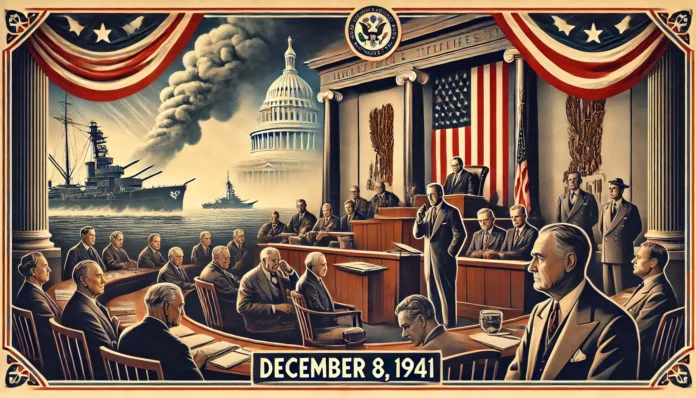On December 8, 1941, our nation stood at a crossroads. The day before, the devastating attack on Pearl Harbor had rocked America to its core, leaving more than 2,400 dead and much of the Pacific Fleet in ruins. But what followed on December 8 wasn’t despair—it was resolve. It was the day we declared war on Japan, officially entering World War II and beginning a journey that would define our role on the world stage and shape the future of the planet.
This wasn’t just a decision made in Congress. It was a moment when we, as a people, united with a shared purpose to protect freedom and confront tyranny.
The Unforgettable Words That Rallied Us
Think about the state of mind on that morning. Families across the country, already shaken by the previous day’s news, gathered around their radios to hear President Franklin D. Roosevelt address Congress. His words weren’t just for the legislators in the room—they were for all of us:
“Yesterday, December 7, 1941—a date which will live in infamy—the United States of America was suddenly and deliberately attacked by naval and air forces of the Empire of Japan.”
That line still sends chills down our spines, doesn’t it? Roosevelt didn’t just describe what had happened; he gave voice to what we all felt: shock, anger, and a deep sense of duty. His speech wasn’t long, but it was powerful, and it ended with a call to action that resonated across the nation. Within hours, Congress voted to declare war on Japan.
How We Came Together
What amazes me most about December 8, 1941, is how quickly we came together. Just a day before, we were a nation largely focused on staying out of a war raging in Europe and Asia. But the attack on Pearl Harbor changed everything. It wasn’t just the government that acted—it was all of us.
Factories shifted gears to produce tanks and planes instead of cars. Men and women alike enlisted in the military, determined to defend our country. At home, families planted victory gardens, rationed food, and bought war bonds to support the effort. Everyone had a role to play, and everyone played it.
It’s humbling to think about what they sacrificed and how they rose to the challenge. They didn’t wait for someone else to step up—they knew it had to be them. And if they could do it, why can’t we rise to the challenges we face today?
The Global Impact of That Day
What happened on December 8 wasn’t just about America; it reshaped the entire world. Our entry into World War II gave the Allies the strength they needed to stand against the Axis powers. It was American ingenuity, determination, and courage that helped turn the tide in battles across Europe, North Africa, and the Pacific.
And it wasn’t just the war we won. Out of that conflict came a new global order. The United Nations was born, and America emerged as a leader on the world stage, championing democracy and freedom. December 8, 1941, wasn’t just the day we joined the war—it was the day we began shaping the world as we know it.
Why It Still Matters
I think about the men and women who lived through that day, who heard Roosevelt’s speech and felt the weight of what was to come. Many of them are no longer with us, but their spirit is. They remind us that when faced with overwhelming odds, we have the power to unite and overcome.
Today, we face different challenges—some global, some personal. But the lesson of December 8 is clear: when we act with resolve and work together, we can do incredible things. That’s not just history; that’s a blueprint for how we can live our lives now.
What We Can Take Away
So as we remember December 8, 1941, let’s do more than reflect. Let’s ask ourselves: How can we show the same courage, unity, and determination in our own time? How can we honor the sacrifices of those who came before us by being better citizens today?
Eighty-three years ago, our nation proved what we’re capable of. That’s not just their story—it’s ours. And it’s up to us to carry it forward.




